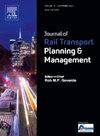欧洲铁路公司效率分析及需求减少的影响
IF 2.7
Q3 TRANSPORTATION
Journal of Rail Transport Planning & Management
Pub Date : 2025-03-08
DOI:10.1016/j.jrtpm.2025.100516
引用次数: 0
摘要
提高铁路的效率是未来可持续交通的关键。这项工作的目的是确定欧洲领先的铁路,调查效率低下的原因,并指导表现不佳的铁路走向最佳实践。我们使用网络数据包络分析探讨了2016-2018年期间选定的21条主要铁路的效率。所获得的排名表明,效率得分平均较低,随着时间的推移略有提高。接下来,我们构建一个绩效矩阵来确定每个公司的优先级改进。Tobit回归表明,国家财富、运输距离、旅行距离和交通密度与效率得分呈显著正相关。我们还观察到,公司的产出对其效率得分没有显著影响,这表明运输需求的任何微小下降都不太可能对效率得分施加显著约束。本文章由计算机程序翻译,如有差异,请以英文原文为准。
Efficiency analysis of European railway companies and the effect of demand reduction
Enhancing the efficiency of railways is key to the future of sustainable transport. The objective of this work is to identify leading railways in Europe, investigate sources of inefficiency, and guide underperformers towards best practices. We explore efficiency for some selected 21 prominent railways during 2016–2018 using Network Data Envelopment Analysis. The ranking obtained indicates averagely low efficiency scores, with slight improvements over time. Next, we build a performance matrix to determine the priority improvements for each company. The Tobit regression implies that the nation's wealth, length of haul, length of trip, and traffic density have a significantly positive relationship with the efficiency scores. We also observed no significant impact of companies' outputs on their efficiency scores, indicating that any minor decrease in transport demand is unlikely to impose significant constraints on efficiency scores.
求助全文
通过发布文献求助,成功后即可免费获取论文全文。
去求助
来源期刊

Journal of Rail Transport Planning & Management
TRANSPORTATION-
CiteScore
7.10
自引率
8.10%
发文量
41
 求助内容:
求助内容: 应助结果提醒方式:
应助结果提醒方式:


